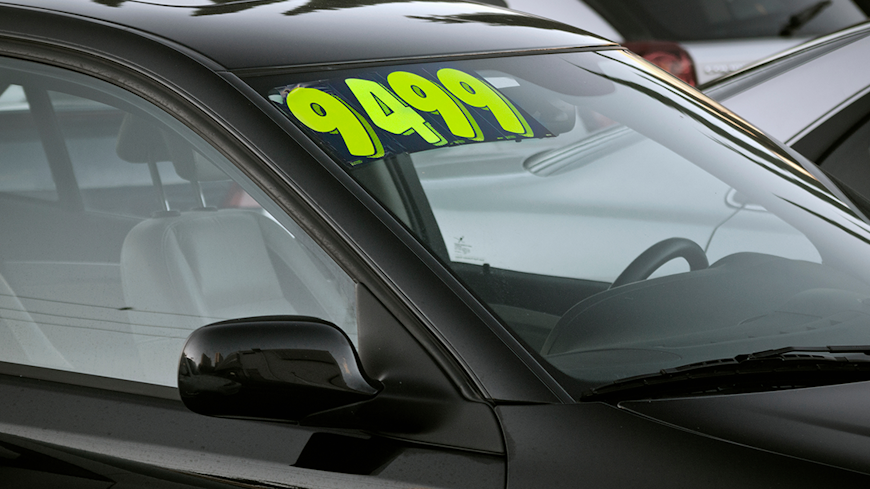If you're sold a lemon, you don’t have to suck it up. You’ve got rights under the Consumer Guarantees Act 1993 (CGA) and Fair Trading Act 1986 (FTA).
What are my rights if I’ve bought a faulty car?
If you bought it from a car dealer, the CGA requires goods to:
be of acceptable quality,
be fit for purpose, and
match their description.
This applies to both new and second-hand cars.
Dealers must also comply with the Fair Trading Act (FTA), which means they can’t make false or misleading claims about a vehicle. The dealer can’t tell you the car is in “mint condition” if it isn’t. Any trader breaching the FTA can be fined up to $600,000.
What is “acceptable quality”?
Acceptable quality means goods:
do what they are made to do
are acceptable in appearance and finish
are free from minor defects
are safe and durable.
Whether something is acceptable depends on what a reasonable consumer would consider acceptable, taking into account a range of factors including the type of vehicle (including the age of the vehicle), the price paid and any claims made by the dealer.
For example, you’d expect a $50,000 car fresh from the factory to give you trouble-free motoring for much longer than a $5000 vehicle that’s been around the block. But that doesn’t mean a dealer can sell you a car they know is a dud. You wouldn’t spend $5000 on a vehicle you knew would break down the second it was driven off the lot.
Who is a motor vehicle dealer?
Anyone who says that they are a motor vehicle dealer, who’s sold more than 6 cars, or imported more than 3 vehicles in a year must be registered. Failure to register can result in a fine of up to $50,000 for individuals, and $200,000 for companies. You can check the Motor Vehicle Traders Register to find out if a dealer is registered or banned.

How do I get the dealer to help?
If your car isn’t up to scratch, the first thing to do is ask the dealer to sort it out.
When the problem is minor, the dealer can choose either to fix it, replace the car or give you a refund. If the problem can’t be fixed, or it is major, you can reject the car and ask for your money back or claim compensation for any drop in value of the car. If the dealer refuses to help, or doesn’t help within a reasonable time, you can either reject the car and ask for a replacement or you can get the repairs done elsewhere and claim the costs back from the dealer.
Can I also claim for costs?
Yes. The CGA gives you the right to claim consequential damages – that’s any reasonably foreseeable costs you’ve incurred as a result of the vehicle’s failure. For example, if you needed to hire a car because yours was off the road due to the fault, you can request the dealer reimburse you.
What if the dealer is being difficult?
You can get an independent inspection to support your case. Put your complaint in writing, telling the dealer what you expect it to do. If you’re rejecting the car, set out the reasons why.
That didn’t work. What now?
You can take the case to the Motor Vehicle Disputes Tribunal (MVDT).
The MVDT is a low-cost avenue for resolving complaints. It costs $50 to lodge a claim and the tribunal can hear disputes involving amounts of up to $100,000. The MVDT hears around 400 cases per year.
You need to provide evidence that supports your claim and shows you gave the dealer a chance to fix the problem if it was minor. Your evidence is likely to include:
any ads for the vehicle and the consumer information notice (or window card)
the vehicle offer and sale agreement, showing what you paid for the car
invoices and GST receipts for any repairs performed on the vehicle
your correspondence with the dealer
any independent inspection reports and quotes for repairs
colour photographs of any vehicle damage or parts involved in the dispute.
You should include a statement of how you want the dealer to resolve the issue. The MVDT will notify the dealer of your claim and set a hearing date. It can also order its own expert report on the vehicle.

We know your rights
Got a problem with a faulty product, received shoddy service or been misled by a retailer? Our expert advisers can provide clear, practical advice that you can trust.
What if I bought the car on finance?
If you’ve bought the vehicle with a loan arranged by the dealer and you’re rejecting the car under the CGA, the dealer can be held liable for the loan.
When taking out a loan, the Credit Contracts and Consumer Finance Act (CCCFA) gives you a cooling-off period of 5 working days. If you haven’t taken possession of the car, you can cancel both the loan and the agreement to purchase the car. However, if you’ve already driven the car off the lot, you’ll still have to pay.
What happens if I can’t repay the loan?
The CCCFA obliges all lenders – including car finance companies – to lend responsibly. They must help you understand the costs of the loan and shouldn’t be lending to you if you can’t afford to repay the loan.
If you do get into financial difficulties, you can make a hardship application to the lender, asking to postpone payments for a while or extend the term of the loan and reduce your regular repayments.
If the lender unreasonably refuses your hardship application – or isn’t meeting its responsible lending obligations – you don’t have to put up with it. All lenders must belong to 1 of 4 dispute resolution schemes. You can make a complaint to the relevant scheme if the lender’s not playing by the rules.
The approved dispute resolution schemes are:
Banking Ombudsman
Insurance and Financial Services Ombudsman
Financial Services Complaints Limited
Financial Dispute Resolution Service
Let the Commerce Commission know too. It can prosecute companies for breaches of the CCCFA.
What if I bought from a private seller?
Unfortunately, if you bought a vehicle from someone you met in the pub or a private seller on Trade Me, you’re not protected by the CGA or FTA. You’ll have to rely on the more limited protections available under the Contract and Commercial Law Act (CCLA).
When am I covered?
You may be able to rely on the CCLA if a seller misrepresents the car to you and you’re persuaded to buy it based on that misrepresentation.
If the seller’s misrepresentation leaves you seriously out of pocket, you may be able to cancel the deal.
How do I get a refund from a private seller?
If you think a private seller has misled you, you can take them to the Disputes Tribunal. The hitch is sellers can contract out of the provisions of the CCLA – and if they do, these rights won't apply.
Can I claim damages?
Yes. The CCLA also gives you the right to claim damages so that you can be compensated. For example, you can claim the difference between the actual value of the car and the value if the misrepresentation had actually been true. But there are limits and it is ultimately up to the Tribunal to determine whether you should be awarded damages. You also have a duty to minimise your losses – so your claim's not likely to succeed if you've continued to repair a vehicle with major faults.
There are also limits on the amount you can claim at the Tribunal. It can only hear claims up to $60,000. So if you’ve forked out $70,000 buying a motorhome from a private seller, the Tribunal isn’t an option, unless you’re prepared to limit your claim. You’ll have to go to the District Court instead.
Here’s more information on Disputes Tribunals.

Consumer Information Notices
A dealer is required to attach a “consumer information notice” (CIN) to every motor vehicle displayed for sale. There must be a link to the CIN if a trader is selling used cars on the internet.
The information that must be disclosed in the CIN includes:
The name and business address of the dealer.
The dealer’s registration number.
The cash price of the vehicle, including GST and any registration and licensing costs.
Whether any security interest is registered over the vehicle.
The year in which the vehicle was manufactured or the manufacturer’s designated “model year” or the year of first registration (for motor vehicles registered before 1 January 2007). For vehicles registered after 1 January 2007; the year of first registration anywhere in the world.
The make, model, engine capacity and fuel type of the vehicle.
The registration plate number.
Whether the vehicle is subject to any road user charges.
Whether the vehicle has radio receiver capability.
The year in which the vehicle was first registered in New Zealand, or if the vehicle is a used import, the year it was first registered overseas.
The odometer (distance travelled) reading, or a statement that the odometer reading is or may be inaccurate.
Whether the vehicle is recorded on the motor vehicle register as having been imported as a damaged vehicle.
Whether the vehicle has a warrant or certificate of fitness and is registered, and the dates on which these expire.
If you buy the car, you must be given a copy of the CIN.
If a vehicle is displayed without a CIN, or the information on the CIN is misleading, you can complain to the Commerce Commission.
The commission can prosecute for breaches of the FTA. If you buy the vehicle and then discover you were misled you may be able to take action yourself under the FTA.
Case studies
Case study: the $10,900 Mazda
Chelsea Slattery bought a 2005 Mazda from dealer Fairgocars. She financed the $10,900 car with a loan from Go Car Finance, arranged for her by the dealer.
Before she bought the Mazda, she noticed the vehicle’s airbag light was flashing and asked the dealer to fix it but the repair didn’t solve the problem and the fault returned. Ms Slattery took the vehicle back at least 3 more times to have it fixed but without success.
Ms Slattery told Fairgocars she was rejecting the car and stopped making loan payments. Go Car Finance subsequently repossessed the vehicle.
When the case went to the Motor Vehicle Disputes Tribunal, its expert assessor advised there was a fault causing the airbag light to flash. Whenever the light flashed, the car’s airbags and seatbelt pre-tensioners were disabled – a major safety issue.
The tribunal adjudicator found the fault was major and Ms Slattery was entitled to reject it. As she’d bought the car on finance arranged by Fairgocars, the dealer was held liable for her obligations under the loan contract.
Fairgocars had to refund Ms Slattery the money she’d paid towards the loan, as well as the fee she paid to have the vehicle assessed.
The adjudicator also recommended Go Car Finance reconsider its repossession practices, criticising it for repossessing the vehicle when there was an ongoing dispute.
Case study: the $9300 VW
Lee Fowler bought a 2008 VW Touran with 100,794km on the clock from registered dealer Goldex Ltd. In January, the $9300 car started misfiring. After unsuccessful attempts to fix the fault, Mr Fowler took the car back to Goldex for repair.
The company told him it had done a software update and the misfiring problem had been fixed. But the problem hadn’t been resolved. The MVDT found someone had disabled the vehicle’s detection system so the engine control unit wouldn’t pick up the misfiring.
Based on evidence from the tribunal’s assessor, the adjudicator considered the misfiring problem was most likely to be the result of faulty fuel injectors, which would cost $2700 to replace.
Goldex denied it had anything to do with disabling the detection system, but the adjudicator found the car was in the company’s control when it happened, so Goldex had to take responsibility.
The adjudicator held the faults with the car were major. He was therefore entitled to reject the car and get his money back plus the costs of the independent inspection for which he’d paid.
Case study: The $4500 BMW
Wellington resident Hitesh Vallabh bought a 2004 BMW with 139,200km on the odometer from Auckland trader Impulse Motors for $4500. But when the car was delivered in February, it wouldn’t start.
Mr Vallabh replaced the battery and got the car going, but soon after it the car developed a fault with the transmission. Quotes put the cost of repair at $4000.
Impulse Motors claimed there was no problem with the transmission and said Mr Vallabh had instead caused an electrical fault when he installed the new battery. It claimed this fault resulted in the car incorrectly registering a problem with the transmission.
But when the matter went to the Motor Vehicle Disputes Tribunal, the adjudicator found in favour of Mr Vallabh.
The adjudicator considered a reasonable consumer wouldn’t expect a vehicle of this age and mileage to develop a costly transmission fault so soon after purchase. As a result, Mr Vallabh was entitled to have the fault repaired and to be reimbursed for the costs of getting the problem diagnosed.
However, Mr Vallabh wasn’t entitled to claim back the battery costs as the adjudicator found he hadn’t given Impulse Motors the chance to fix this fault.


